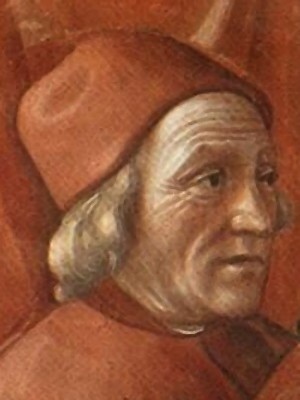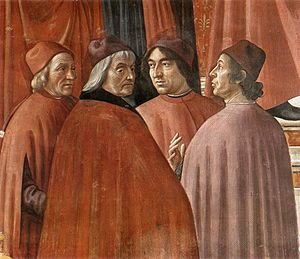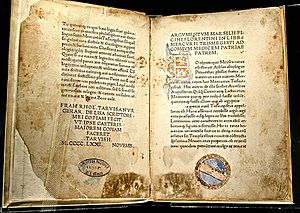Marsilio Ficino facts for kids
Quick facts for kids
Marsilio Ficino
|
|
|---|---|

Marsilio Ficino from a fresco painted by Domenico Ghirlandaio in the Tornabuoni Chapel, Santa Maria Novella, Florence
|
|
| Born | 19 October 1433 Figline Valdarno, Republic of Florence |
| Died | 1 October 1499 (aged 65) Careggi, Republic of Florence |
| Citizenship | Florentine |
| Period | Italian Renaissance |
| Genre | Neoplatonism |
| Notable works |
|
| Relatives |
Diotifeci d'Agnolo
Alessandra di Nanoccio (parents) |
Marsilio Ficino (Latin name: Marsilius Ficinus; born October 19, 1433 – died October 1, 1499) was an Italian scholar and Catholic priest. He was one of the most important thinkers of the early Italian Renaissance.
Ficino was also an astrologer. He helped bring back the ideas of Neoplatonism. He was the first person to translate all of Plato's known writings into Latin. His "Florentine Academy" tried to restart Plato's original school. This academy greatly influenced the Italian Renaissance and the way people thought in Europe.
Contents
Life and Learning
Ficino was born in Figline Valdarno, Italy. His father, Diotifeci d'Agnolo, was a doctor. He worked for Cosimo de' Medici, a very powerful man.
Cosimo de' Medici supported young Marsilio. He even made Ficino a teacher for his grandson, Lorenzo de' Medici. Another famous student of Ficino was Pico della Mirandola, a well-known Italian philosopher.
A New Academy
From 1438 to 1445, a big meeting happened in Florence. It was called the Council of Ferrara-Florence. During this time, Cosimo de' Medici met a philosopher named George Gemistos Plethon. Plethon's talks about Plato were so interesting that people called him "the second Plato."
In 1459, John Argyropoulos was teaching Greek in Florence. Ficino became his student. Cosimo de' Medici decided to start Plato's Academy again in Florence. He chose Ficino to lead it.
In 1462, Cosimo gave Ficino Greek books by Plato. Ficino then began translating all of them into Latin. He finished the first drafts in 1468–1469, and they were published in 1484. Ficino also translated other important ancient texts. These included the Hermetica and writings by other Neoplatonist thinkers like Porphyry and Plotinus.
One of Ficino's students was Francesco Cattani da Diacceto. Ficino believed Diacceto would lead the Florentine Platonic Academy after him. Diacceto's student, Giovanni di Bardo Corsi, wrote a short story about Ficino's life in 1506.
Even though Ficino was trained as a doctor, he became a priest in 1473.
His Writings

In 1474, Ficino finished his book about the soul living forever. It was called Theologia Platonica de immortalitate animae (Platonic Theology).
Ficino was very interested in astrology, which is the study of how stars and planets might affect people's lives. This interest caused him some problems with the Catholic Church. In 1489, he was questioned by Pope Innocent VIII about his beliefs. He needed strong support to avoid being punished.
In 1492, Ficino wrote that his time was like a "golden age." He said that many liberal arts were brought back to life. These included grammar, poetry, rhetoric, painting, sculpture, architecture, and music. He also believed that astrology had become much better in his century.
Ficino's letters, written between 1474 and 1494, have been published. He also wrote De amore (1484). His book De vita libri tres (Three books on life), published in 1489, gave advice on health. It also shared the Neoplatonist idea that the world and human souls are connected.
He wrote:
There will be some men or other, superstitious and blind, who see life plain in even the lowest animals and the meanest plants, but do not see life in the heavens or the world... Now if those little men grant life to the smallest particles of the world, what folly! what envy! neither to know that the Whole, in which 'we live and move and have our being,' is itself alive, nor to wish this to be so.
Ficino used astrology to explain this connection. In Book of Life, he described how actions and their results are linked. He listed things that he believed influenced a person's future.
Medical Insights
Because his father was a doctor, Ficino wrote about medical topics. He wrote Consiglio contro la pestilenza (Advice against the plague) and De vita libri tres (Three books on life). His medical ideas influenced other Renaissance doctors. He believed in the connection between the human body and the larger universe.
These books were very popular. They included ideas about astrology and alchemy. This led to some people suspecting him of having unusual beliefs. This was especially true after his third book came out in 1489. It gave specific advice on healthy living.
Platonic Love
Ficino is famous for coining the term "Platonic love." This idea first appeared in a letter he wrote in 1476. In 1492, Ficino published his Epistulae (Letters). These included letters about Platonic love written to his friend Giovanni Cavalcanti. Ficino's letters helped make the idea of Platonic love popular in Western Europe.
Death and Legacy
Marsilio Ficino died on October 1, 1499, in Careggi. In 1521, a statue of him was made by Andrea Ferrucci. It is located in the Cathedral of Santa Maria del Fiore in Florence.
See also
 In Spanish: Marsilio Ficino para niños
In Spanish: Marsilio Ficino para niños
 | Madam C. J. Walker |
 | Janet Emerson Bashen |
 | Annie Turnbo Malone |
 | Maggie L. Walker |


